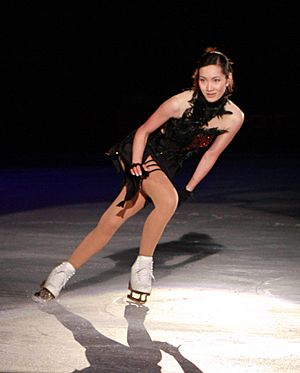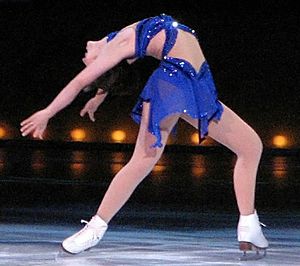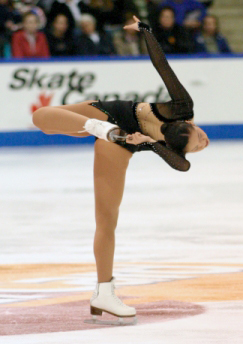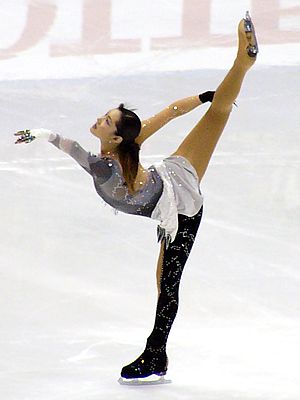Shizuka Arakawa facts for kids
Quick facts for kids Shizuka Arakawa |
|
|---|---|

Arakawa at the 2009 Festa On Ice.
|
|
| Personal information | |
| Country represented | |
| Born | December 29, 1981 Shinagawa, Tokyo, Japan |
| Height | 1.66 m |
| Skating club | Prince Hotel |
| Retired | May 7, 2006 |
Shizuka Arakawa (荒川 静香, Arakawa Shizuka, born December 29, 1981) is a famous Japanese figure skater. She won the gold medal at the 2006 Winter Olympics. She was also the World champion in 2004.
Shizuka Arakawa was the first Japanese skater to win an Olympic gold medal in figure skating. She was also the second Japanese woman to win a gold medal at the Winter Olympics. She was the only Japanese athlete to win a medal at the 2006 Winter Olympics.
After her Olympic win, Arakawa stopped competing. She started skating professionally in ice shows. She also works as a sportscaster for Japanese television.
Contents
About Shizuka Arakawa
Shizuka Arakawa was born in Shinagawa, Tokyo, Japan. She grew up in Sendai and its nearby towns. She is the only child of Koichi and Sachi Arakawa.
In 2000, Arakawa started studying at Waseda University. She earned a degree in social sciences in 2004. She was still competing as a skater while she was in college. She won the 2004 World Figure Skating Championships just after finishing her final exams.
For a while, she lived and trained in Simsbury, Connecticut. This was after her first training rink in Sendai closed.
Shizuka Arakawa looks up to other figure skaters like Kristi Yamaguchi and Yuka Sato. She enjoys listening to music by artists like Christina Aguilera and Beyoncé. Her hobbies include shopping, driving, swimming, and golf. She also likes cooking and marine sports. Arakawa collects beanie babies and has several pets. She has a shih tzu dog named Charo and a hamster named Juntoki. She also has four other dogs: Choco, Tiramisu, Aroma, and Rosa.
Arakawa got married on December 29, 2013, which was her 32nd birthday. She had her first child, a daughter, on November 6, 2014. On May 23, 2018, she welcomed her son.
Shizuka Arakawa's Skating Career
Starting Out in Skating
Shizuka Arakawa became interested in skating when she was 5 years old. She joined the Chibikko Skate School. At age 7, she started taking ballet lessons. She also began training with Hiroshi Nagakubo, a former Olympic skater. By the time she was 8, Arakawa was already landing triple Salchows.
In 1994, she started competing in national skating events in Japan. She was named the All Japan Junior Figure athlete three years in a row (1994, 1995, 1996). Arakawa quickly moved up the ranks in Japanese skating. She was the first skater in Japan to win three junior national titles in a row.
Senior Level Skating
Arakawa became the senior national Japanese champion in 1998 and 1999. She competed in her first Olympics at age 16. This was at the 1998 Winter Olympics in Nagano. The Emperor and Empress of Japan watched the ladies' free skate event. She finished 13th at those Olympics. In 2002, Arakawa placed second at Japan's national championships. Because of this, she was not chosen for the Japanese team for the 2002 Winter Olympics.
During the 2002–2003 skating season, Arakawa won gold at the Asian Winter Games and the Winter Universiade. She also earned her second silver medal in a row at the Four Continents Championships. She won a bronze medal at the NHK Trophy. She qualified for the ISU Grand Prix Final, where she finished fourth. She later placed third at the Japanese Nationals. This was her fifth medal from this competition.
In 2004, she won the World Championships in Dortmund, Germany. She beat American skaters Sasha Cohen and Michelle Kwan. Arakawa landed seven clean triple jumps in her performance. She was the third Japanese woman to win this title. The others were Midori Ito (1989) and Yuka Sato (1994). Arakawa had planned to retire after the 2004 World Championships. But her victory made her change her mind.
In 2005, Arakawa won the NHK Trophy. She also placed second at the Grand Prix Finals. At the 2005 World Championships, Arakawa finished 9th. This was a disappointment for her. She later said it motivated her to keep skating and get back to her best form. In November 2005, Arakawa started working with a new coach, Nikolai Morozov.
Winning Olympic Gold in 2006
At the 2006 Winter Olympics in Turin, Italy, Arakawa skated her short program to music by Chopin. She was in third place before the long program. The top three skaters, including Sasha Cohen and Irina Slutskaya, were very close in scores.
Arakawa won the free program. She skated to "Violin Fantasy on Puccini's Turandot" by Vanessa Mae. She performed an Ina Bauer move, which became very famous in Japan. She also did a three-jump combination. Arakawa earned a total score of 191.34 points. This was almost eight points more than Sasha Cohen, who finished second. Irina Slutskaya made mistakes and took the bronze medal.
At 24 years old, Arakawa became the oldest woman to win an Olympic skating title in over 80 years. Her gold medal was Japan's only medal at the 2006 games. After her win, the Japanese Prime Minister Junichiro Koizumi called her to congratulate her.
Life After Competition
Arakawa retired from competitive skating after her Olympic win. She continued to perform in ice shows. She is also a regular skating commentator on Japanese television. She produces her own show called "Friends on Ice." She also performs in "Fantasy on Ice." Arakawa also creates choreography for skaters.
In 2006, Arakawa appeared in a Japanese TV drama called Shichinin no onna bengoshi (7 female lawyers). She played a public prosecutor in one episode.
In 2010, she competed in an ABC skating series called "Thin Ice." She was paired with Olympic silver medalist Stéphane Lambiel. They finished third in the series.
As a professional figure skater, she has appeared in the cross-genre ice show Hyoen multiple times. She also performed in its spin-off Luxe.
On April 18, 2018, Arakawa was chosen to be part of the World Figure Skating Hall of Fame. In October 2024, she joined other skaters to launch a fan community called F-Ske.
Shizuka Arakawa's Signature Moves

Arakawa was known for her strong jumps. She could do difficult triple-triple combinations. These included the triple Salchow-triple toe and the triple Lutz-triple toe. Sometimes she even added a double loop. She practiced triple-triple-triple combinations too. Figure skating expert James R. Hines said Arakawa was "remembered for her artistry."
Arakawa was also known for how quietly her skate blades moved on the ice. She was a strong spinner. She had an excellent donut spin, which needs a lot of flexibility. In 2004, she added a Biellmann spin to her routines. Arakawa's special spiral move was a Y-spiral. She would release her free leg and keep it close to her head without using her hand.
Her most famous move is the Ina Bauer with a full backbend. When Arakawa performed this move at the 2006 Olympics, "Ina Bauer" became a very popular phrase in Japan. Her performance of it became iconic. People in Japan often refer to the Ina Bauer move using Arakawa's name.
Awards and Honors
- Japan Medals of Honor: Purple Ribbon
- Japanese Olympic Committee: Special Achievement Award (2002), Best Award (2005)
- Miyagi "Citizens Award of Honor" (2006)
- World Figure Skating Hall of Fame: Inducted in 2018
Images for kids
See also
 In Spanish: Shizuka Arakawa para niños
In Spanish: Shizuka Arakawa para niños
 | William L. Dawson |
 | W. E. B. Du Bois |
 | Harry Belafonte |




